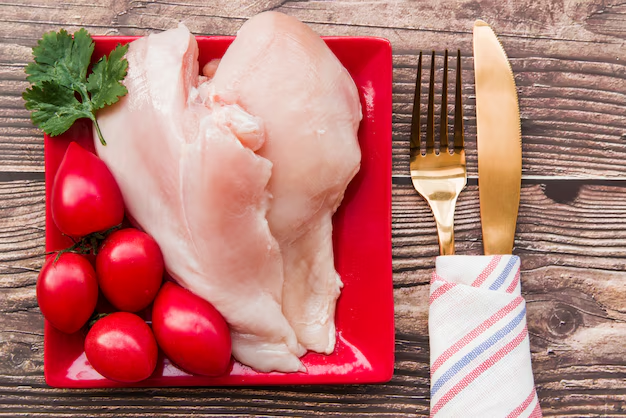How Long Can You Keep Cooked Chicken in the Fridge Without Worrying?
Cooked chicken is a welcome addition to many meals, given its versatility and delicious flavor. However, understanding its shelf life is essential for ensuring food safety and preventing foodborne illnesses. If you're like many home cooks, you've probably wondered at some point how long that leftover chicken can sit in the fridge before it's no longer safe to eat. Let's explore this topic in depth to provide you with all the information you need for safe food storage.
🍗 The Basics of Storing Cooked Chicken
When it comes to storing cooked chicken, the refrigerator is your best friend. Properly storing cooked chicken ensures that it remains safe to eat and retains its flavor and texture. According to general food safety guidelines, cooked chicken can be stored in the refrigerator for up to three to four days. By the end of this timeframe, pathogenic bacteria that can lead to foodborne illnesses are more likely to multiply, increasing the risk of food poisoning.
Why Three to Four Days?
This guideline is based on the fact that, even when refrigerated, bacterial growth can occur. Refrigeration only slows this process; it doesn't stop it entirely. The conditions inside a fridge are cold enough to impede the broad reproduction of bacteria, but they're not effective in eliminating them entirely. After three to four days, the cold environment may no longer be sufficient to maintain safety.
🌡️ Proper Refrigeration Techniques
To keep your cooked chicken fresh and extend its shelf life, consider following these refrigeration tips:
- Use Airtight Containers: Store chicken in airtight containers to prevent contamination and moisture loss. This will help the chicken stay better for longer.
- Optimize Fridge Temperature: Make sure your refrigerator is set to 40°F (4°C) or colder. This temperature range is optimal for slowing bacterial growth.
- Label with Dates: Always label your food with the date it was cooked. This simple act helps you keep track of when the chicken needs to be consumed.
- Store Promptly: Refrigerate leftover chicken within two hours of cooking. This prevents the chicken from sitting in the temperature danger zone where bacteria grow most rapidly.
🔬 Understanding Foodborne Bacteria
Various bacteria, such as Salmonella and E. coli, are notorious for causing foodborne illnesses. These harmful bacteria can proliferate in cooked chicken if it is stored improperly or for too long. Recognizing how bacteria behave can lead to safer food handling practices.
Common Symptoms of Foodborne Illness
Symptoms of food poisoning often include:
- Nausea
- Vomiting
- Diarrhea
- Stomach cramps
- Fever
If these symptoms appear after consuming chicken, it might be due to improper storage or expired food.
🕒 Extending the Shelf Life
One practical question home cooks often contemplate is how to extend the shelf life of their cooked chicken. Fortunately, there are several strategies you can implement to enjoy your chicken longer.
Freezing Cooked Chicken
Freezing is one of the best ways to make cooked chicken last beyond its fridge shelf life. By transferring cooked chicken to the freezer, you extend its life significantly.
- Freezing Time: Cooked chicken remains safe in the freezer for up to four months. However, for the best quality, it’s advised to consume it sooner.
- Proper Packaging: To prevent freezer burn, wrap chicken tightly in foil or freezer paper, or use a vacuum-sealed bag. This also protects against flavor and texture changes.
Quick Thawing Techniques
When you decide it's time to use your frozen cooked chicken, thaw it safely:
- Thaw Overnight: Place the chicken in the fridge to thaw overnight, ensuring it’s at a safe temperature.
- Cold Water Bath: For quicker thawing, seal the chicken in a waterproof bag and immerse it in cold water. Change the water every 30 minutes.
- Use the Microwave: If you’re in a hurry, use the microwave's defrost setting. Make sure to cook the chicken immediately after thawing.
🔄 Ensuring Quality
While safety is the primary concern, maintaining the quality of your cooked chicken also matters. Here are tips to maintain both the safety and palatability of stored chicken:
- Avoid Repeated Reheating: Each time food is cooled and reheated, quality deteriorates, and opportunities for bacterial growth increase. Reheat only what you need.
- Check for Odd Smells or Colors: If chicken develops an unusual odor, color, or texture, it's wise to discard it. Trust your senses.
- Use Proper Reheating Methods: When reheating, ensure the chicken reaches an internal temperature of 165°F (74°C) to kill any potential bacteria.
🍽️ Creative Uses for Leftover Cooked Chicken
Maximize your leftovers by creatively incorporating them into different meals. This not only diversifies your menu but also ensures nothing goes to waste.
Meal Ideas
- Chicken Salad: Mix cooked chicken with mayonnaise, celery, and grapes for a refreshing salad.
- Taco Filling: Shred leftover chicken and use it as a filling for tacos, with lettuce, cheese, and salsa.
- Quick Stir-Fry: Add chicken to a skillet with vegetables and soy sauce for a quick stir-fry.
- Chicken Soup: Utilize chicken in soups by adding it to broth with noodles, carrots, and herbs.
📊 Quick Summary
Here's a handy list of tips and timelines when it comes to storing cooked chicken:
- Refrigerator Shelf Life: 3-4 days 🍗
- Freeze Time: Up to 4 months ❄️
- Optimal Fridge Temp: 40°F (4°C) or below 🥶
- Reheat Temp: 165°F (74°C) 🔥
Pro Tips for Best Results
- 🕑 Store Quickly: Refrigerate within two hours of cooking.
- ❄️ Vacuum Seal for Freezing: Keeps quality intact.
- 🥄 Use Creative Meal Ideas: Maintain versatility and excitement.
Bringing It All Together
Navigating cooked chicken storage doesn't need to be daunting. With these guidelines and practices, you can enjoy your chicken safely while minimizing waste, saving money, and diversifying your meals. Whether you're enjoying a quick chicken salad or a hearty soup, knowing you stored and handled your chicken properly makes for both delicious and worry-free dining.

